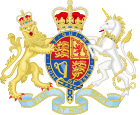Lord Chancellor
| Lord High Chancellor of Great Britain | |
|---|---|
 Arms of Her Majesty's Government | |
| Style | The Right Honourable |
| Appointer | The Sovereign on advice of the Prime Minister |
| Inaugural holder | The Lord Cowper |
| Formation | May 1707 of Kingdom of Great Britain |
The Lord High Chancellor of Great Britain, or Lord Chancellor is a senior and important functionary in the government of the United Kingdom. He is the second highest ranking of the Great Officers of State after the Lord High Steward. The Lord Chancellor is appointed by the Sovereign on the advice of the Prime Minister. Before the Union there were separate Lord Chancellors[1] of England and Scotland.
The Lord Chancellor is responsible for the efficient functioning and independence of the courts.[2] The current Lord Chancellor is Kenneth Clarke, who as with his predecessor Jack Straw is also Secretary of State for Justice. Clarke holds the position, as did Straw, while serving as a Member of Parliament in the House of Commons.
Formerly, there were separate Chancellors of England, Scotland and Ireland. When the Kingdom of England and the Kingdom of Scotland united to form the Kingdom of Great Britain under the Acts of Union 1707 the offices of the Chancellor of England and the Lord Chancellor of Scotland were combined to form a single office of Lord Chancellor for the new state.
References
- ↑ The title can be pluralized 'Lord Chancellors' or 'Lords Chancellor'. The former is more common and is used for consistency throughout the article. See Gardner, B., (2001), A dictionary of modern legal usage, Oxford University Press, p. 538.
- ↑ Formerly he was also the presiding officer of the House of Lords, and the head of the judiciary in England and Wales, but the Constitutional Reform Act 2005 transferred these roles to the Lord Speaker and the Lord Chief Justice respectively.
Bibliography
- Campbell, J., 1st Baron. (1868). Lives of the Lord Chancellors and Keepers of the Great Seal of England From the Earliest Times Till the Reign of King George IV, 5th ed. London: John Murray.
- Davies, M. (2003). Companion to the Standing Orders and guide to the Proceedings of the Lords, 19th ed.
- Department for Constitutional Affairs. (2003). "Constitutional Reform: Reforming the Office of the Lord Chancellor"
- House of Lords. (2003–2004). Bill 30 (Constitutional Reform Bill).
- "Lord High Chancellor" (1911). Encyclopædia Britannica, 11th ed. London: Cambridge University Press.

